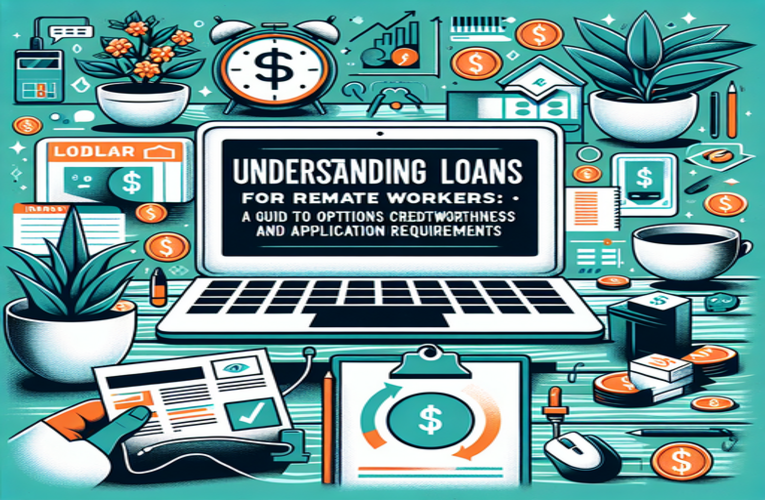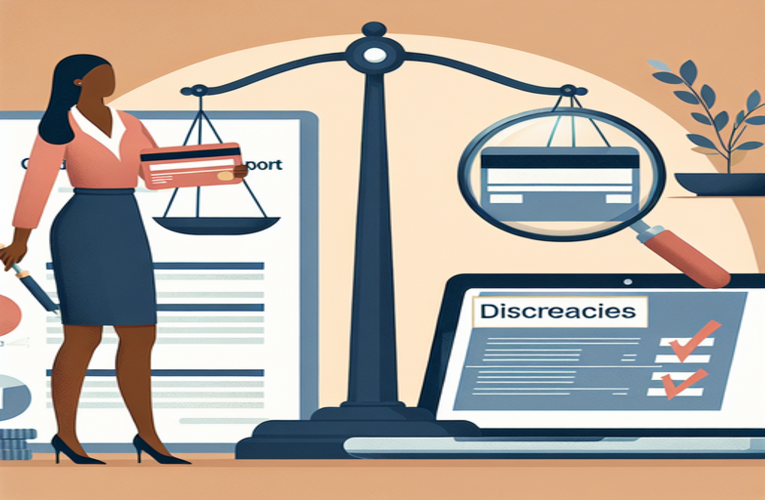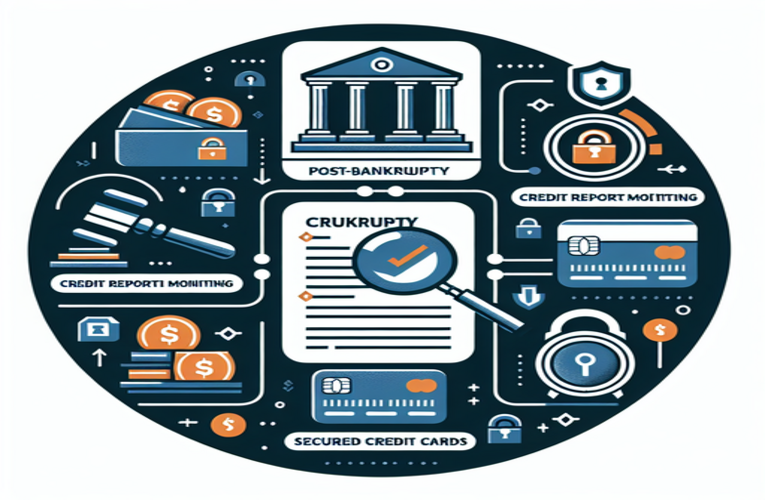Steps to secure a loan for a new business: a comprehensive guide to successful funding
Starting a new business is an exhilarating endeavor that requires thorough planning and wise financial decisions. One of the most critical challenges you will encounter is securing a loan for your new business to fund your entrepreneurial aspirations. Understanding the process of obtaining financing for a startup and knowing the various funding options available can greatly impact your company’s growth and sustainability.
In this article, we will explore:
- Different types of business loans for new businesses suitable for various needs.
- Key requirements and steps to secure loan approval from lenders.
- How to evaluate and compare lenders to find the best financing terms.
- Tips to enhance your chances when applying for a business loan.
With strategic financing being vital for startups, we aim to equip you with the knowledge needed to make informed financial choices. Whether you are exploring ways to finance your new business for equipment, operational costs, or expansion, understanding your unique needs and the available options will set you on the path to realizing your business vision. Let’s delve deeper into how you can effectively navigate the steps to secure a loan for your new enterprise.
Starting a new business often requires substantial capital to get off the ground. Securing financing can be a complex process, but understanding the steps involved can significantly improve your chances of obtaining the necessary funds. This guide outlines the essential steps to secure a loan for your new business, providing valuable insights into financing options, application processes, and strategies to enhance your loan approval prospects.
Table of Contents
Understanding Your Business Financing Needs
Before applying for a loan, it is crucial to clearly define your business’s financial requirements. Determining the exact amount of funding needed and how it will be used lays the foundation for choosing the most appropriate financing option.
- Startup Costs: Calculate expenses for equipment, inventory, licenses, and initial marketing efforts.
- Operational Expenses: Estimate funds required for daily operations, including rent, utilities, and payroll.
- Expansion Plans: Consider future growth needs, such as new locations or additional product lines.
For example, a startup requiring $100,000 for equipment and initial inventory might pursue a term loan, while a business needing $20,000 for marketing could consider a business credit card or line of credit.
Exploring Loan Options for New Businesses
There are various financing options available to new businesses, each with its own benefits and requirements. Understanding these options helps in selecting the loan type that best fits your needs.
- Traditional Term Loans: Provide a lump sum of capital repaid over a fixed period with interest. Ideal for significant one-time investments.
- SBA Loans: Government-backed loans offering favorable terms and lower interest rates. Suitable for businesses with a solid business plan and credit history.
- Business Lines of Credit: Allow flexible borrowing up to a set limit. Useful for managing cash flow fluctuations and unexpected expenses.
- Microloans: Small loans, typically under $50,000, offered by nonprofit organizations. Accessible to startups lacking extensive credit history.
- Equipment Financing: Loans specifically for purchasing equipment, where the equipment itself serves as collateral.
- Crowdfunding: Raising funds through small contributions from a large number of people, often via online platforms.
For instance, if your business needs immediate funds for purchasing machinery, equipment financing might be the most suitable option. Alternatively, if you prefer not to incur debt, crowdfunding can help raise capital while engaging your future customer base.
Key Requirements to Secure Financing for Startups
Lenders evaluate several factors when considering loan applications from new businesses. Meeting these key requirements increases your chances of approval.
Creditworthiness and Financial History
- Personal Credit Score: A score of 690 or higher is preferred by most lenders. A strong credit history demonstrates financial responsibility.
- Business Credit Score: If available, a good business credit score can further strengthen your application.
Business Experience and Performance
- Time in Business: Lenders often require at least six months to two years of operating history.
- Annual Revenue: Meeting minimum revenue thresholds, typically between $50,000 and $250,000, shows business viability.
- Cash Flow Analysis: Demonstrating consistent cash flow assures lenders of your ability to repay the loan.
Comprehensive Business Plan
A detailed business plan is essential for loan applications, especially for new businesses without an extensive financial track record.
- Executive Summary: Concisely describes your business concept, goals, and what sets you apart from competitors.
- Market Analysis: Provides insights into industry trends, target market, and competitive landscape.
- Financial Projections: Includes income statements, cash flow statements, and balance sheets projecting at least three years ahead.
- Use of Funds: Clearly explains how the loan proceeds will be utilized to grow the business.
Businesses with well-prepared plans are more likely to secure financing, as they demonstrate professionalism and foresight.
Evaluating and Comparing Business Loan Lenders
Choosing the right lender is as important as selecting the right loan. Careful evaluation of various lenders ensures you find the best terms suited to your business needs.
Types of Lenders
- Traditional Banks: Offer competitive interest rates but may have stricter eligibility criteria and longer approval processes.
- Online Lenders: Provide faster approval and funding times with more flexible requirements, but may charge higher interest rates.
- Credit Unions: Member-owned institutions that may offer personalized service and favorable rates to qualified applicants.
- Microlenders: Nonprofit organizations offering small loans to startups and businesses in underserved markets.
Criteria for Comparison
- Interest Rates: Compare annual percentage rates (APRs) to understand the true cost of borrowing.
- Loan Terms: Evaluate repayment periods and schedules to ensure they align with your cash flow.
- Fees and Charges: Be aware of origination fees, prepayment penalties, and late payment fees.
- Customer Service: Consider the lender’s reputation for customer support and responsiveness.
For example, an online lender may offer quick funding but at a higher APR compared to a traditional bank. If speed is critical, accepting a higher rate might be justified. Alternatively, if lower costs are a priority, waiting for bank approval could be advantageous.
Enhancing Your Business Loan Application
Preparing a thorough and compelling loan application increases your likelihood of approval. Attention to detail and proactive measures can make a significant difference.
Improve Your Credit Profile
- Review Credit Reports: Obtain personal and business credit reports to check for errors or areas needing improvement.
- Pay Down Debts: Reduce existing debt levels to lower your debt-to-income ratio.
- Maintain Timely Payments: Establish a history of on-time payments to build credibility.
Gather Essential Documentation
- Financial Statements: Prepare up-to-date balance sheets, income statements, and cash flow statements.
- Tax Returns: Provide personal and business tax returns for the past two to three years.
- Legal Documents: Include business licenses, registrations, and any relevant contracts or agreements.
- Collateral Information: If applicable, detail assets that can secure the loan.
Personalize Your Application
- Write a Cover Letter: Introduce yourself and your business, expressing your commitment and vision.
- Highlight Strengths: Emphasize unique selling points, market opportunities, and management expertise.
- Provide References: Include letters of recommendation from suppliers, clients, or industry professionals.
Seek Professional Advice
Consulting with a financial advisor or accountant can help you refine your application and address potential concerns. They can assist with financial projections and offer guidance on lender expectations.
By following these fundamental steps to secure a loan for a new business, you position yourself for successful financing and lay a strong foundation for your enterprise’s growth and sustainability. Thorough preparation and understanding of the lending landscape empower you to make informed decisions and turn your entrepreneurial vision into reality.
Summary
Here’s a concise overview of the crucial points regarding securing a loan for your new business:
1. Choosing the Right Loan Type:
- Assess your funding needs—consider options like traditional business loans, lines of credit, and microloans for startups.
- Align the loan type with your specific requirements to maximize benefits and support your business growth.
2. Key Requirements for Approval:
- Aim for a credit score of 690 or higher to improve your eligibility for financing.
- Have a stable business history of at least six months to demonstrate reliability to lenders.
- Ensure your annual revenue meets the lender’s criteria for loan approval.
- Demonstrate strong cash flow and present a comprehensive business plan to showcase your business’s potential.
3. Evaluating and Comparing Lenders:
- Explore financing options from traditional banks, online lenders, and fintech companies.
- Carefully review loan terms, including interest rates, repayment schedules, and any flexible payment options.
- Look for any hidden fees that could affect your overall financing costs and long-term obligations.
4. Enhancing Loan Approval Chances:
- Prepare a detailed loan application that clearly outlines your financial needs and business objectives.
- Assemble relevant documentation, including financial statements, tax returns, and a comprehensive business plan to support your application.
- Understand different loan options available, such as SBA-backed loans and other government-supported financing programs.
By focusing on these key areas, you can make informed decisions that ultimately boost your chances of securing the financing needed to turn your business vision into reality.
FAQ
Q: What factors influence the interest rates offered by business loan lenders?
A: Business loan interest rates can be influenced by several factors, including the overall economic climate, your business credit score, the type of commercial loan you are applying for, and the risk associated with lending to your business. Additionally, the lender’s policies, market competition, and the current benchmark rates set by central banks play significant roles. Lenders assess these elements to determine a suitable interest rate for your business financing needs.
Q: How can I improve my business credit score before applying for a loan?
A: To enhance your business credit score before applying for a business loan, you can pay off outstanding business debts, make timely payments on existing loans and business credit cards, reduce your business credit utilization ratio, and avoid opening new lines of credit before applying for financing. Additionally, maintaining accurate financial records and regularly reviewing your business credit report for any discrepancies can significantly improve your creditworthiness.
Q: Are there any alternatives to traditional business loans for financing my company?
A: Yes, there are several alternatives to traditional business loans for financing your company, including crowdfunding platforms, angel investors, peer-to-peer lending, and government or private grants. Each alternative has its unique requirements and benefits, so it’s important to consider your business’s specific needs, growth stage, and the trade-offs involved when selecting the best financing option.
Q: What documents do I need to prepare for a business loan application?
A: Typically, you will need to prepare a comprehensive business plan, recent financial statements, tax returns, a list of business assets, and possibly a personal financial statement. Some lenders may also require information on collateral, ownership details, and projections for future income. Ensuring that all these documents are accurate and well-organized can enhance your loan application’s chances of approval.
Q: How long does it usually take to get approved for a business loan?
A: The timeline for business loan approval can vary widely depending on the lender and the type of loan you are seeking. Traditional bank loans may take several weeks to process due to thorough underwriting procedures, while online lenders and alternative financing options may offer quicker approvals, sometimes within a few days. It’s important to inquire about the expected timeline during your application process.
Q: Can I apply for a business loan if my company has no established business history?
A: While having an established business history is often preferred by lenders, some financial institutions offer loans specifically designed for startups and new businesses. In such cases, a strong business plan, a solid personal credit score, and evidence of potential profitability can significantly improve your chances of securing funding even without an extensive business history.
Q: What should I include in my business plan to increase my chances of loan approval?
A: To increase your chances of loan approval, your business plan should include detailed financial projections, a comprehensive market analysis, an overview of your business model, and a clear strategy for growth and profitability. Additionally, including information about your management team, operational plans, and how you intend to use the loan funds can help lenders understand your business direction and potential for success.
Q: How do repayment terms vary between different business loan lenders?
A: Repayment terms for business loans can vary significantly based on the lender and the type of loan product. Some lenders may offer short-term loans with higher monthly payments but quicker repayment periods, while others may provide long-term loans with lower monthly payments spread out over several years. Additionally, terms such as interest rates, prepayment penalties, and flexibility in repayment schedules can differ, so it’s important to review and compare these options carefully to find the best fit for your business’s financial situation.


















